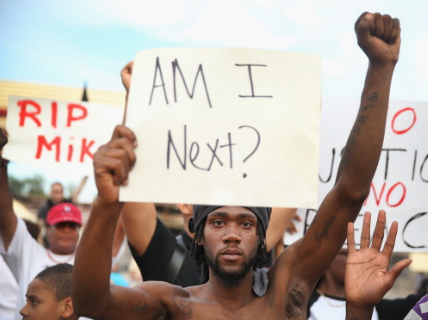Why Obama Can't Lead on Racial Justice
Ferguson has exposed the bankruptcy of his pro-government views

Barack Obama's presidency was supposed to usher in America's post-racial era. But Ferguson, Mo., shows that hope was perhaps too audacious.
The cause of racial justice might need not a black Democrat but a white Republican—just as normalization with China required not a liberal peacenik but a security hawk like Richard Nixon.
Ferguson has been up in arms since Michael Brown's killing. The police officer may have been justified in shooting an unarmed teenager six times at close range—or maybe he wasn't. But communities can overlook an unjustified killing if it isn't reflective of a larger trend—just as they can overreact to a justified killing if it is.
And in Ferguson, as in America, there is certainly a trend of black targeting.
Ferguson's 67 percent black population has long reviled the city's 90 percent white police force. And with good reason: Blacks are not only more likely to be stopped while driving, but twice more likely to be arrested when stopped than whites, usually for minor infractions.
Nor is Ferguson an outlier.
Whites are twice as likely to have used drugs than blacks, but blacks are arrested for drug possession three times more often than whites. Blacks serve virtually as much time in prison for drug offenses as whites for violent crimes. What's more, the ACLU found that 42 percent of those impacted by military-style SWAT raids are blacks.
Perhaps blacks are targeted for being black—or perhaps they are less able to fight the system. Either way, as columnist Steve Chapman notes, blacks live in a different America from whites.
Obama has sent more staffers to attend Brown's funeral than Margaret Thatcher's. But when it comes to actual words, he's offered nothing but the most anodyne statements. Why? There are three reasons (beyond simply acting presidential):
One: There's a huge gulf between black and white perceptions about the fairness of America's criminal justice system. Eighty percent of black respondents in a Pew poll said that the Ferguson shooting raised "important issues about race." But only 37 percent of whites did. Given this divide, a black president who inveighs against police discrimination risks looking like he's special pleading, not promoting justice. This would only alienate the majority population whose buy-in is needed for reform.
Two: The problem is not just that Obama is black, but that he's black and from a party with a reputation for coddling criminals rather than fighting crime. When the country was suffering a crime wave in the 1970s and '80s, Democrats were seen as AWOL. Hammering Democratic squishiness allowed Republicans to win many elections, including the presidency in 1989 when George H.W. Bush ran the infamous Willie Horton ad. (Horton, a black convict, brutally raped and assaulted a woman during a weekend "furlough," thanks to a program that Michael Dukakis, Bush's opponent, supported as Massachusetts governor.)
But now that crime rates have dropped, Republicans are better positioned to dismantle the police state they erected.
Three: Columnist Walter Russell Mead has observed that America's relations with blacks today are governed by the "1977 political compromise" that allowed Democrats to use Big Government to open economic opportunities for blacks and Republicans to use it for the "stern and unrelenting repression of inner-city lawlessness and crime."
Since then, the libertarian wing in the GOP has forced a systematic rethinking among Republicans about the excesses of Big Government. For example, as Ferguson authorities used armored vehicles and sound cannons to quell the riots, Sen. Rand Paul, R-Ky., boldly condemned Washington not only for incentivizing the "militarization of local police precincts" but also the disparate impact this was having on vulnerable minorities.
But there is no comparable rethinking among Democrats. To the contrary, Obama has condemned folks like Paul as anti-government yahoos. "If the people cannot trust their government to do the job for which it exists—to protect them and to promote their common welfare—all else is lost," Obama said in a speech in 2006.
Such categorical declarations make it hard for him to admit that the government is the problem in Ferguson.
Obama's biography and party affiliation had already hamstrung him in championing racial justice. But his paeans to the wonderfulness of government have rendered him intellectually bankrupt and hamstrung him further. What minorities really need is not Obama but an anti-Obama: an outspoken white, limited-government Republican who cares.
This column originally appeared in the Washington Examiner.


Show Comments (101)